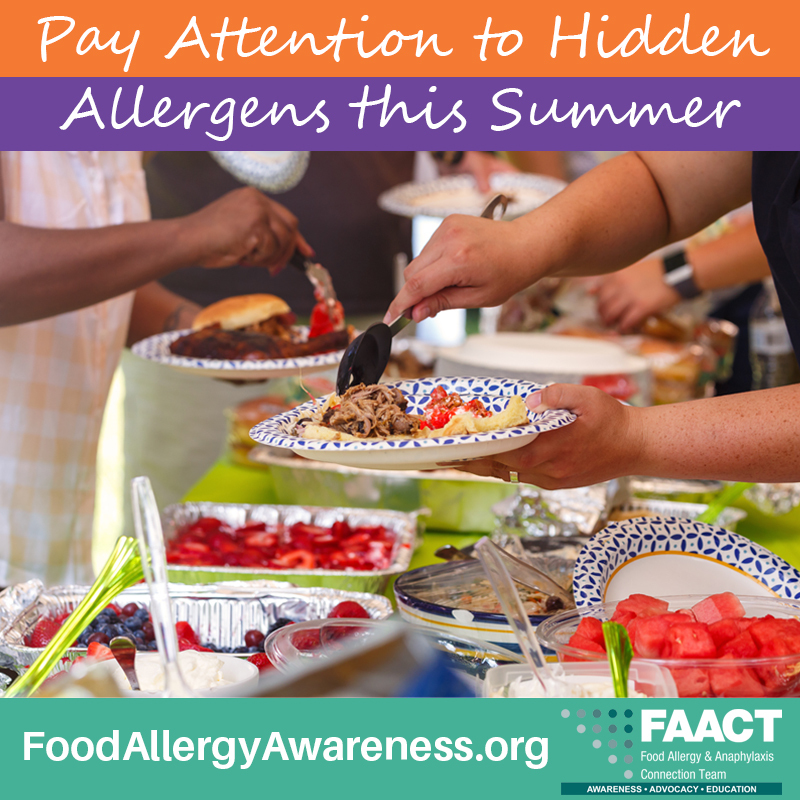Pay Attention to Hidden Allergens This Summer

Pay Attention to Hidden Allergens This Summer
by Caroline Moassessi, FAACT Vice President of Community Relations
What’s your first summer memory? Was it a BBQ at the neighbor's house or playing tag on your grandma’s lawn? Summer is a time when families and friends enjoy time together and fun-filled adventures. Yet this time can be stressful for families managing food allergies because it often involves unfamiliar seasonal foods at gatherings such as picnics and potlucks. We have a few tips on label reading and summer products where allergens may hide. Non-food products are not held to the same labeling laws as packaged foods.
Eating Out. Our favorite allergen-safe restaurants often offer seasonal items with new ingredients. Don't assume they are safe! For adults ordering colorful seasonal cocktails, ask extra questions. Drinks may include liqueurs containing allergens or unexpected ingredients like foams created with egg whites. Ask about cross-contact risks, such as how cocktail shakers are washed between uses.
Skin Protection. Read ingredient lists carefully, and don't assume that last year's sunblock is still safe. Companies change ingredients, and nut oils are often used to help moisturize skin. Examine tinted sunscreens for the face, too—even from your favorite makeup line. Sun products may differ from the rest of the makeup line.
BBQs and Grilled Foods. Sauces and rubs can hide allergens, such as sesame seeds, peanut butter, dairy, and other “secret sauce” ingredients. Read labels and skip risks. Chips and other shareable items may also contain allergens and pose cross-contact risks. If you spot an allergen in a shared food, speak to the host about removing the item. Better yet, ask ahead of the event and offer to bring safe handheld food items. If your hosts are grilling, consider bringing precooked items wrapped in foil that can be tossed on the grill.
Potlucks. Potlucks can be minefields of allergens without some preplanning. If you are hosting, create signs listing each dish’s ingredients and save all ingredient labels for guests to read. If you are hosting someone with an allergy to a food you usually don't avoid it in your kitchen, ask them to bring a dish or their own food. If you're a guest, offer to bring safe dishes, and speak to the host about handheld items that must be avoided. Lastly, position foods so each dish has a separate serving utensil and guests do not have to reach over other dishes, creating a potential risk of cross-contamination.
Lip balms. Some brands use nut, seed, or soy oils in their balms. Check labels and call manufacturers to learn about cross-contact risks.
Traveling/Day Trips. Stock up on hand wipes and pack your own hand soap, since soaps in public restrooms are often not labeled. Consider buying soap sheets or carrying your small travel bars of soap for bathroom stops. If eating out, stay vigilant in favorite restaurant chains since food suppliers differ by region. Always ask questions about ingredients and food preparation.
Enjoy your family time while you keep your allergen-super sleuthing skills in good shape.
If you are traveling this summer, head to FAACT's Traveling with Food Allergies resources.
Lastly, always carry two epinephrine products—and have the best of times creating memories with your family.

